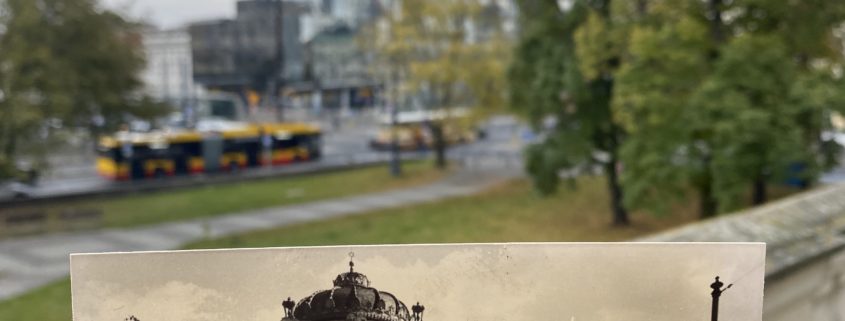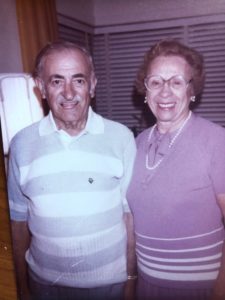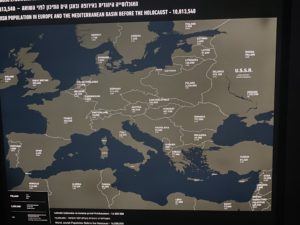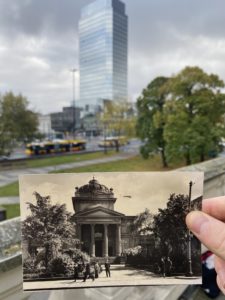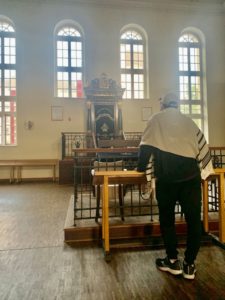Minyan Man
By Max Goldberg
A week before I was set to arrive in Wrocław, my Grandpa Ted passed away. I was fortunate enough to have spent the final moments of his life alongside him in the very same hospital he had worked in for more than 40 years, in Phoenix, Arizona. His story is incredible. We spoke for hours about his adventures across the world, and how excited he was for me to be making such a personally challenging trip to such an interesting place.
“Poland is not the same country it used to be.”
His own father, my namesake and great-grandfather, had come to New York to make a living selling dry goods and household items right as the holocaust began across the world. Before that, he had fled the persecution of Jews in Europe, from the city of Ivano-Frankivsk in present-day Western Ukraine. In his time, the city was known as Stanislawow, within the borders of interwar Poland. He had his surname changed by American immigration officers so that it was easier to pronounce, and it was then that any thought of returning to Eastern Europe was done away with.
My Grandpa Ted had gone to visit his father’s town many years ago in a very different time, under the occupation of the USSR. Of course, it was not the same. There was something missing. While the brutality and oppression of Jews at the hands of Nazi Germany is (or at least should be) well known, the fate of Europe’s Jews under Soviet communism was atrocious in its own right. The incredibly few Jews who remained in Poland after the Holocaust were stripped of citizenship by Communist authorities in 1968. In Ukraine, Jews were not permitted to leave at all. During this time, Jewish identity continued to be eradicated under Stalin, and “Hebrew” families were sent to camps to be murdered, just by men in a different uniform.
Every Jew has a story like mine, like my grandfather’s, and his father’s. Judaism is full of stories about finding perseverance and hope in strange new lands, about seeking refuge and powering past persecution as a community. Our survival is celebrated in Jewish holidays and in our culture. Jewish storytellers today aren’t exactly the legends they used to be, but this recurring motif is the foundation of contemporary Jewish art as well, just as it has been for thousands of years. One modern song, although not necessarily deserving of a Grammy, highlights this eternal Jewish strength perfectly. It’s titled Minyan Man, originally sung by Lenny Solomon under the stage name Shlock Rock, later featuring the most famous American Jewish men’s acapella group of all time, the Maccabeats. If that sentence doesn’t sum up the state of Judaism in America today, I don’t know what does. In the song, Mr. Shlock tells the audience about his experience as a lonesome Jew traveling across America’s South and stopping in Alabama on the eve of Shabbat.
“Walked around the town wondering what to do, cause Shabbos is no time for feeling blue.”
Give the man his Pulitzer already. For reference, there are only ~9,000 Jews in Alabama. That’s about 2% of the state’s total population, which is actually the same percentage of Jews across the entire United States, the most “Jewish” country in the world by population.
“Then I saw a man who looked the same way too, I was quite relieved to find a fellow Jew.”
The kind Jewish man invites our hero for Shabbat services, in their makeshift temple in the back of a hardware store, where 9 older men are patiently waiting for him to arrive. In Judaism, a Minyan is a term that refers to the number of worshippers required to have a service, ten Jews who are traditionally men. Mr. Shlock is the tenth Jew they have been waiting for because one of the members of the community had recently passed away. The final verse takes place twenty years on, and Shlock remembers the 9 men, now passed, who he prayed with whenever he drove through Alabama.
“The nine men who waited till one came along, how Shabbos was carried on a song.”
When he visited, my grandfather found no Jews left in his father’s old town, and told me about his mixed feelings towards the situation. The majority of Ukrainian Jews left as soon as it was possible to do so, circa 1990. He was glad there were no Jews left there because if there were, they’d be under constant threat. However, there was a longing in his voice, a desire for a connection he did not find. An incomplete search for a man who looked the same way too. He was one of the first Jews to arrive in Phoenix, at a time when American Jews were still forbidden to enter many businesses or properties, and barred from practicing certain professions. Like his father before him on the opposite coast, my Grandpa Ted contributed to the establishment of a resilient Jewish community in a hostile place. He had experienced loneliness as a Jew on his own, so then why did his travel to Europe seem so disappointing? Perhaps because while he built a new Jewish community in Phoenix, the beginning, he saw only the end of a story there. In new lands, my grandfather and his father secured the passing of tradition and the survival of our culture. He found nobody left to do that.
The Minyan man song itself is not great, and if you listen to it you might struggle to get past the ridiculousness and see the deeper meaning of it as I do. Because of it’s strange relatability to my own history, and because I am currently in Poland, I had a Shlock Rock experience myself. I was the Minyan Man, but I do want to point out some important differences between our savior Shlock Rock’s experiences and my own.
•
American Jews have perhaps grown too comfortable, and by that, I mean our history shows we must always remember our rights are never guaranteed. We wonder why any Jew would want to remain in Poland, sometimes calling the country a “graveyard,” but we forget that Judaism has always been about defying the odds and standing tough.
The Jews of Poland are still here. If you look hard enough in Warsaw, you might be able to find them. For their safety, I won’t go into detail about the location of the temple, but you won’t find it on any map or on any signage outside the building. Nestled behind a cosmetics store and the official diplomatic mission of a nation-state that itself has very few Jews, I found two security guards. They checked a list, and I wasn’t on it, so I presented my ID as they asked me my reason for coming.
“What’s your last name?”
“Goldberg.”
“Ah…well okay then.” He shrugged.
I was escorted up a few floors to a small apartment. We walked through the kitchen of the apartment and entered a conference room with plastic chairs lined up in rows, facing the Aron Kodesh, and the sweetest group of elderly Jewish women I ever met. They talked to me all night in Polish, even after several attempts at telling them I didn’t speak Polish. The ladies introduced me to the Rabbi, stressing the fact that he spoke eight languages, and he warmly welcomed me. A young man with down syndrome dressed in orthodox attire, the usher, struck up a conversation with me about our shared Taglit experiences. He also handed me a Kippah, as I hadn’t brought my own. There was a British man working in Germany who was in Warsaw for the weekend, and we shared some laughs about the absurdity of Europe. It was my coziest Synagogue experience to date. Altogether, there were ten people. Nine Jews, and then a scraggly-bearded, short Jewish boy from San Francisco. Me, the Minyan man.
The Rabbi spoke in Polish the entire time, except for during the Hebrew prayers, so I could only pick out words and phrases. His address to the congregation was something about devotion to tradition, about Chleb i wino: bread and wine. There is no Judaism without bread and wine. They are more than just snacks to munch on if you get bored during services. Despite the ongoing pandemic, despite the hostile government in power, despite dwindling congregants, and of course despite Poland’s history, the Rabbi spoke about how the community was still here, eternally devoted to their faith, and ever-present like Chleb i wino. The service continued, sung by the women at the front with their beautiful soprano voices, and then me, off-key, struggling to keep up. As Shlock puts it, Shabbos was carried on a song. After the service, the Rabbi thanked us for attending.
“Where do you study?”
“Wrocław, but we are just here for the weekend.”
“Ah, Wrocław. The Jewish community there is… sleepy. They don’t have a Rabbi right now. They don’t ever have services.” He invited me to make the trip back up to Warsaw at the end of the month. “We have a cantor coming, a very good cantor from Los Angeles. He will speak more English than me.”
The Rabbi and the kind British man were somewhere in their late 30’s or 40’s. Four congregants were elderly women. Four of us were under 30. Granted, the service would have happened regardless of me being there, but I couldn’t help but wonder if somebody was sick, if somebody had passed away, or if this was simply the regular attendance. It also wasn’t a high holiday which, I’ll admit, are the only times I would attend services back home. And, it was late in the pandemic, and therefore some joined the service virtually, watching from home through an iPhone on a tripod. Still, ten Jews including myself are not that many. Unfortunately, this community, like so many other Jewish communities across the world, is struggling to ensure its longevity. Jews are primarily concentrated, and only have growing populations, in two countries: The United States and Israel. The incredible diversity of Judaism begins to disappear as Jews migrate to these two areas seeking safer and more hospitable conditions, and throughout the generations, they assimilate culturally. My great grandfather spoke Yiddish, but was hesitant to teach it to my grandfather, and therefore today all I am left with are words and phrases.
“It’s funny when you guys [American Jews] come here, you are so surprised to see us.”
“We’ve been traveling across the country. We saw lots of museums and memorials. I guess we’re just excited to finally find you.”
“Yes well, we are not many, but more with you. You are welcome back anytime.”
After hearing of my grandfather’s travels, I did not come to this region expecting to meet any Jews. I only had the worst of expectations. I guess this is where my grandfather and my stories differ. His visit was only a few decades after the Shoah, whereas it has now been 85 years. I live in a very different time for memory and a different time for Judaism. My grandfather was an incredible man, and would have made an incredible Minyan man, but he never got the chance. I always think about what would’ve happened if I were to visit Poland thirty years from now. Would the Warsaw Jews still be here, and would the Minyan still be around?
In the hook of the song, Shlock Rock sings “Won’t you stay with us for Shabbos, Minyan man?” Despite having met these Jews just an hour earlier, there was an extremely powerful connection between me, the out-of-shape confused Jew from San Francisco, and 9 others in that small room behind the kitchen in a Warsaw apartment. I am not religious, but I do believe in ensuring the survival of my culture and my traditions. I will forever remember the Jews of Warsaw, no matter what the future brings. Remembering, after all, is all you can truly do to honor those you meet, those who came before you, and those who will come after. I look forward to more travels across the world, where I can be walking around on Shabbat, wondering what to do, and then to my delight, finding a fellow Jew. I miss my grandfather, and I am honored to be the grandson of such an incredible man with an incredible history. His father chose to leave, these Jews chose to stay. There is no right choice, as we all have suffered for our community. We will continue to persevere as we have done for thousands of years, so long as when we see each other across the world, we ask “Won’t you stay with us for Shabbos, Minyan man?”

